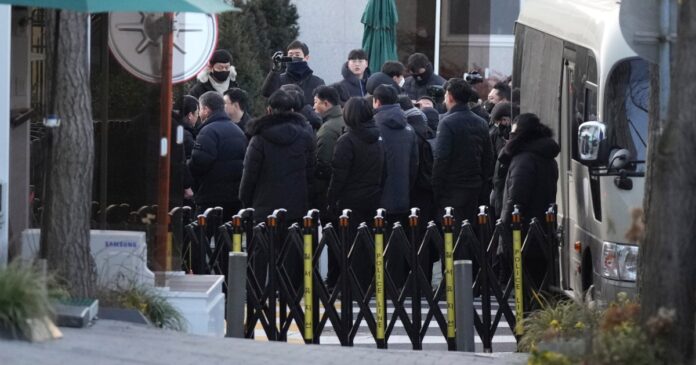DEVELOPING STORYDEVELOPING STORY,
Yoon’s security team blocking investigators from executing arrest warrant, local media says.
South Korean authorities are locked in a standoff with President Yoon Suk-yeol’s security team after arriving at the impeached leader’s residence to execute an arrest warrant over his short-lived declaration of martial law.
Dozens of police and anticorruption investigators arrived at Yoon’s compound in Seoul early on Friday morning to detain the embattled leader only to be blocked by the Presidential Security Service (PSS).
PSS chief Park Jong-joon denied entry to officials rom the Corruption Investigation Office for High-ranking Officials (CIO) after citing restrictions on secured areas, the state-funded Yonhap News Agency reported, citing anonymous police sources.
“CIO prosecutors and investigators are in a standoff with the Presidential Security Service in front of the residence after moving past the first and second barriers,” Yonhap quoted a police official as saying.
Yoon’s security detail has previously blocked investigators from executing several search warrants directed at the president, whose brief imposition of martial law on December 3 plunged the East Asian country into its deepest political crisis in decades.
Jo Seung-lae, a lawmaker for the liberal opposition Democratic Party, called on Yoon’s bodyguards to stand down.
“Do not drag the upright staff of the Presidential Security Service and other public officials into the depths of crime,” Jo said.
Speculation about when and how authorities would take Yoon into custody has swirled since a Seoul court earlier this week granted prosecutors’ request for an arrest warrant.
If arrested, the conservative leader would be the first sitting president to be detained in South Korean history.
Yoon Kap-keun, a lawyer for Yoon, on Friday reiterated his position that investigators were acting outside their authority and the law, a day after the president’s legal team filed for an injunction to block the warrant at the country’s Constitutional Court.
In a defiant New Year’s message to supporters who have gathered outside his residence, Yoon pledged to “fight until the end to protect this country together with you”.
Yoon has defended his brief martial law decree as legal and necessary, citing the need to “eradicate pro-North Korea forces” and investigate unsubstantiated claims of election fraud.
Braving freezing temperatures, thousands of Yoon’s supporters have rallied outside his compound in recent days to demand an end to the investigation and the reversal of his impeachment.
“President Yoon Suk-yeol will be protected by the people” and “Illegal warrant is invalid”, protesters chanted on Thursday.
Authorities have deployed about 2,700 police and 135 police buses in the area to prevent violence between pro- and anti-Yoon protesters, state-funded Yonhap News Agency reported.
If found guilty of insurrection, one of the few crimes for which a sitting president does not enjoy immunity from prosecution, Yoon faces severe penalties, including life imprisonment and the death penalty.
Yoon, who served as the nation’s top prosecutor before entering politics, has been suspended from his duties since December 14, when the National Assembly voted 204-85 for his impeachment.
Finance Minister Choi Sang-mok has served as acting president since December 27, when the legislature voted to impeach Yoon’s initial successor, Han Duck-soo, over his refusal to immediately fill three vacancies on the Constitutional Court, which is deliberating whether to uphold Yoon’s impeachment or restore his presidential authority.
The court has up to six months to make its ruling, with at least six justices on the nine-member bench needed to uphold Yoon’s impeachment and remove him from office.

